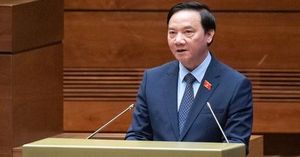South Korea is making strides toward modernizing its customs processes with the launch of its new AI-powered customs system, which aims to streamline operations and reduce wait times significantly. The South Korean Customs Service unveiled this innovative approach during a recent event, emphasizing its potential to revolutionize the efficiency of customs procedures.
Set to be fully operational by the end of 2025, this cutting-edge system is expected to utilize machine learning and advanced data analysis techniques to predict and manage customs workloads effectively. Reported by the South Korean Customs Service, the initiative reflects the increasing need for modernization to keep up with growing global trade volumes.
The system promises to address some of the most pressing challenges faced by customs departments worldwide, including lengthy processing times and the necessity for accurate screenings. According to officials, the introduction of AI will enable customs agents to handle shipments more swiftly, thereby promoting smoother trade operations. "The new AI system will transform the way we handle customs, making it faster and more efficient," stated the South Korean Customs Service.
South Korea's Minister of Finance reinforced the significance of this launch, stating, "We are committed to leading the world with our innovative customs technology." This demonstrates not only a proactive approach within South Korea but also sets precedents for other nations to follow amid the increasing reliance on technology to streamline governmental operations.
The system's anticipated benefits include enhanced accuracy during screenings and improved real-time data sharing among customs officials, which could lead to timely interventions when anomalies arise. This capacity for rapid response is particularly beneficial during peak shipping seasons, where traditional customs processes often struggle to keep pace.
Numerous technology firms, including several industry leaders, are collaborating with the South Korean Customs Service to implement the system, showcasing the nation's dedication to innovation. This collaboration highlights how technological advancements can effectively tackle age-old bureaucratic hurdles, ushering in an era of efficiency and reliability.
Recent forecasts suggest the new system could cut processing times by approximately 30% within the first year of its launch. These projections are bolstered by the realities of modern trade, where delays can cost businesses significant time and resources. The interest surrounding South Korea's approach to customs automation demonstrates global curiosity about how AI can reshape governmental functions.
Overall, the adoption of this AI-powered customs system signals South Korea’s strategic vision to stay at the forefront of global trade innovations. By enhancing operational efficiency and adapting swiftly to market demands, South Korea is poised to set new standards within the customs sector worldwide. The successful integration of this system may inspire other countries to reassess their own customs practices and explore similar advancements.
With this leap forward, South Korea aims not only to improve its internal operations but also to bolster its position as a key player on the global trading stage. The launch of this transformative system could have far-reaching impacts on trade efficiency and security, making it one of the most significant customs initiatives of the decade.



